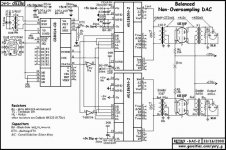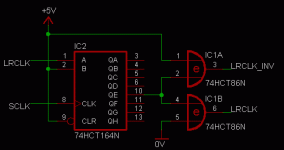yes, I did what you say but i cann't find nothing i need
I also put the"pcm63 non-os" in the search engine ,but the result is as bellow
I also put the"pcm63 non-os" in the search engine ,but the result is as bellow
You can use CS8413
If you have read CS8413's datasheet, you will find it support 20bit right-justfied output formart, so it's the best choice for NOS PCM63 and PCM1702 and so on.
If you have read CS8413's datasheet, you will find it support 20bit right-justfied output formart, so it's the best choice for NOS PCM63 and PCM1702 and so on.
Hi AD1865,
Is it possible to use CS8412 or CS8414? Since it not easy to get CS8413.
If i use CS8412/4, which output format should i use? I2S or 20bit standard?
Cheers
Leo
Is it possible to use CS8412 or CS8414? Since it not easy to get CS8413.
If i use CS8412/4, which output format should i use? I2S or 20bit standard?
Cheers
Leo
Re: You can use CS8413
You would need to use a microcontroller to configure it and find a way to tie off the last 4 bits otherwise they would be in an indeterminate state.
While the CS8413 approach might do for a standalone design it hardly an elegant solution if one is modifying an existing design.
AD1865 said:If you have read CS8413's datasheet, you will find it support 20bit right-justfied output formart, so it's the best choice for NOS PCM63 and PCM1702 and so on.
You would need to use a microcontroller to configure it and find a way to tie off the last 4 bits otherwise they would be in an indeterminate state.
While the CS8413 approach might do for a standalone design it hardly an elegant solution if one is modifying an existing design.
Re: Re: You can use CS8413
markamp
Yes, you must use microcontroller to configure it. But why would they be in an indeterminate state if you don't tie off the last 4 bits? Assume the input formart is 16bit. If you set it to 20bit right-justified, the last 4 bit are zero. I have used CS8414, if you set to 18bit right-justified formart, it can fit well with AD1865. The last 2 bit is zero.But CS8414 can't support 20bit right-justified formart.rfbrw said:
You would need to use a microcontroller to configure it and find a way to tie off the last 4 bits otherwise they would be in an indeterminate state.
While the CS8413 approach might do for a standalone design it hardly an elegant solution if one is modifying an existing design.
markamp
By setting the CS8412 to 20bits all you are saying is that the CS8412 can pass up to 20bits. If you send 16 bits it will pass 16 with 4 indeterminate bits unless they are tied off, if you send 20 it pass all 20 and if you send 24 it will truncate 8. All the CS8412 does is pass what is sent to it. It does not dither, round-off or zero-pad and only truncates when the wordlength exceeds the set register size. To do anything else would render sending 20 bit data pointless. Unless, of course, you happen to believe the CS8412 can differentiate between 20bit and 16bit sources and tie off the last 4 bits as needed or it simply turns everthing into 16 bits.
This topic has been covered before in reference to the CS8420 where in certain formats all data is assumed to be 24bits long and sending 16 bit data simply leaves 8 bits flapping in the wind.
This topic has been covered before in reference to the CS8420 where in certain formats all data is assumed to be 24bits long and sending 16 bit data simply leaves 8 bits flapping in the wind.
CS8412/4 can't support 20bit output
The 8-27 bits of S/PDIF word are data. If you input 16bit formart, the 8-11 bits are zero! If you set CS8411/3 to 20bit right-justified output formart, the last 4 bits of course are zero. If you set it to 18bit formart, the last 2 bits also are zero, which is used in Audio Note DAC5 and I also tryed it, the last 2bits are not random number. It needn't render sending 20 bit data, because the S/PDIF word contains 20bit data.
The 8-27 bits of S/PDIF word are data. If you input 16bit formart, the 8-11 bits are zero! If you set CS8411/3 to 20bit right-justified output formart, the last 4 bits of course are zero. If you set it to 18bit formart, the last 2 bits also are zero, which is used in Audio Note DAC5 and I also tryed it, the last 2bits are not random number. It needn't render sending 20 bit data, because the S/PDIF word contains 20bit data.
Of course the CS8412/4 can support 20bit output .
Bits 8 to 27 are for audio data. Bits 4 to 7 can be for audio data. The CS841x series can pass up to 24 bit data. The idea that the CS841x rx's turn everthing into 16 bit is complete rubbish.
BTW indeterminate does mean random. It means unknown.
Bits 8 to 27 are for audio data. Bits 4 to 7 can be for audio data. The CS841x series can pass up to 24 bit data. The idea that the CS841x rx's turn everthing into 16 bit is complete rubbish.
BTW indeterminate does mean random. It means unknown.
AD1865 has 18 bit LSB justified data. PCM63 has 20 bit LSB justified data. The CS8412 is set for 18 bit data. If the AD1865 was replaced with the PCM63, the MSB would be two bits out of position.
sorry not having been precise enough. I meant only the part between the CS8414 and the AD1865. So when using a CP8412 in 20 Bit-Modus combined with the PCM, e.g. as done in the DAC of SHeldon Stokes (www.quadesl.com) and others, is then a simple 74HC04 in between enough to do the job ?
The CS8412/4 does not have a 20 bit mode so you will need more than an inverter. Of the 8 normal modes (M3=0) only modes 5 and 6 fix the audio data wordlength. Mode 5 is 16 bits and mode 6 is fixed at 18. In the Stokes dac the data sent to the SM5843 is 16 bit data.
There is a schematic earlier in the thread that connects I2S signals to the PCM63. There is also one for 16bit LSB justified data i.e. the output of the YM3623 or mode 5 of the CS8412/4 but you will have to search the forum a bit if you want that one.
There is a schematic earlier in the thread that connects I2S signals to the PCM63. There is also one for 16bit LSB justified data i.e. the output of the YM3623 or mode 5 of the CS8412/4 but you will have to search the forum a bit if you want that one.
- Status
- Not open for further replies.
- Home
- Source & Line
- Digital Source
- who can sent me the non-os pcm63 Schematic


